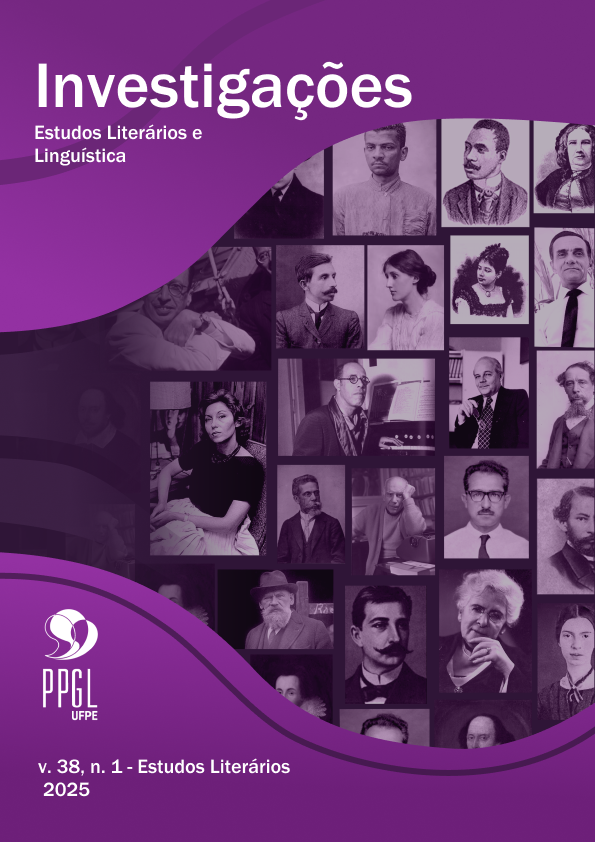Erudite poetry or popular poetry? From Greek Melic to “cantoria de repente”
DOI:
https://doi.org/10.51359/2175-294x.2025.265139Keywords:
erudite poetry, popular poetry, melic, repenteAbstract
This article explores the differences and intersections between erudite and popular poetry, as well as the references involved in poetic construction. It examines the connections among Baudelaire, Augusto dos Anjos, and Diniz Vitorino, as well as between Greek melic poetry and the "cantoria de repente" tradition. Drawing on the works of Vieira (2017), Derive (2010), Chartier (1995), Cândido (1996), Zumthor (1993), and Friedrich (1978), the study provides a comparative analysis of poets and poetic forms across different eras and contexts. The analysis concludes that the diversity of artistic expressions enriches culture, transcends rigid classifications, and celebrates the plurality of poetic language.
References
ANJOS, Augusto dos. Eu. Rio de Janeiro: [s.c.p.] 1912.
BAUDELAIRE, Charles. As Flores do Mal. Tradução: Ivan Nóbrega Junqueira. Rio de Janeiro: Editora Nova Fronteira, 1985.
BOURDIEU, Pierre. A Distinção: Crítica Social do Julgamento. Tradução: Daniela Kern e Guilherme J. F. Teixeira. Porto Alegre: Zouk, 2007.
CÂNDIDO, Antônio. O Estudo Analítico do Poema. São Paulo: Humanitas Publicações / FFLCH/USP, 1996.
CHARTIER, Roger. Cultura popular: revisitando um conceito historiográfico. Estudos Históricos, Rio de Janeiro, n. 16, p. 179-192, 1995.
CHARTIER, Roger. Cultura popular: revisitando um conceito historiográfico”. Revista Estudos Históricos, Rio de Janeiro, v. 8 n. 16, 1998.
DERIVE, Jean. Oralidade, Literalização e Oralidade da Literatura. Tradução: Neide Freitas. Belo Horizonte: FALE/UFMG, 2010. Disponível em: http://www.letras.ufmg.br/padrao_cms/documentos/eventos/vivavoz/Oralidade,%20literariza%C3%A7%C3%A3o%20e%20oraliza%C3%A7%C3%A3o%20da%20literatura%20site.pdf. Acesso em: 5 jun. 2022.
FRIEDRICH, Hugo. Estrutura da lírica moderna. Tradução: Marise M. Curioni e Dora F. da Silva. São Paulo: Livraria Duas Cidades, 1978.
LUCIANO, Aderaldo. Apontamentos para uma história crítica do
cordel brasileiro. Rio de Janeiro; São Paulo: Edições Adaga; Luzeiro, 2012.
MARCUSCHI, Luiz Antônio; DIONISIO, Angela Paiva. Fala e escrita. 1. reimp. Belo Horizonte: Autêntica, v. 208, 2007.
ROCHA, Roosevelt. Lírica Grega Arcaica e Lírica Moderna: Uma Comparação. Philia & Filia, Porto Alegre, v. 3, n. 2, jul./dez. 2012.
SILVA, Josivaldo Custódio da. Pérolas da cantoria do repente em São José do Egito no Vale do Pajeú: memória e produção cultural. João Pessoa, 2011.
SUASSUNA, Ariano. Romance da Pedra do Reino e o Príncipe do Sangue do Vai-e-volta. Rio de Janeiro: Editora Jose Olympio LTDA, 2005.
VIEIRA, Trajano. Lírica Grega, Hoje. São Paulo: Perspectiva, 2017.
VITORINO, Diniz. Lírios do Canto. Recife: Oficina-Escola de Artes Gráficas Espaço Pasárgada, 1989.
ZUMTHOR, Paul. A letra e a voz: a “literatura” medieval. Tradução: Amálio Pinheiro e Jerusa Pires Ferreira. São Paulo: Companhia das Letras, 1993.
ZUMTHOR, Paul. Introdução à poesia oral. Tradução: Jerusa Pires Ferreira. São Paulo: Hucitec; Educ (PUC-SP), 1997.
Downloads
Published
How to Cite
Issue
Section
License
Copyright (c) 2025 Edmilson Ferreira dos Santos

This work is licensed under a Creative Commons Attribution 4.0 International License.
Authors who publish with Revista Investigações agree to the following terms:
Authors retain copyright and grant the journal right of first publication with the work simultaneously licensed under the Creative Commons Attribution 4.0 International (CC BY 4.0) license that allows others to share the work with an acknowledgement of the work's authorship and initial publication in this journal.
Authors are able to enter into separate, additional contractual arrangements for the non-exclusive distribution of the journal's published version of the work (e.g., post it to an institutional repository or publish it in a book), with an acknowledgement of its initial publication in this journal.
You are free to:
Share — copy and redistribute the material in any medium or format for any purpose, even commercially.
Adapt — remix, transform, and build upon the material for any purpose, even commercially.
The licensor cannot revoke these freedoms as long as you follow the license terms.
Under the following terms:
Attribution — You must give appropriate credit , provide a link to the license, and indicate if changes were made . You may do so in any reasonable manner, but not in any way that suggests the licensor endorses you or your use.
No additional restrictions — You may not apply legal terms or technological measures that legally restrict others from doing anything the license permits.

